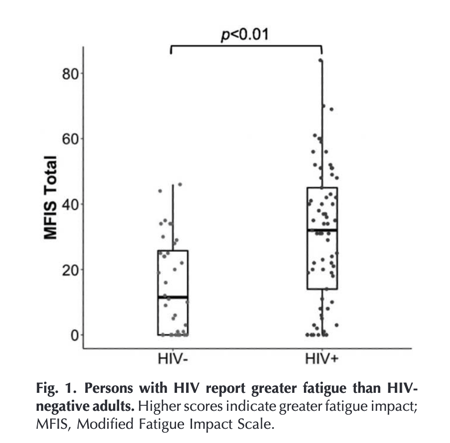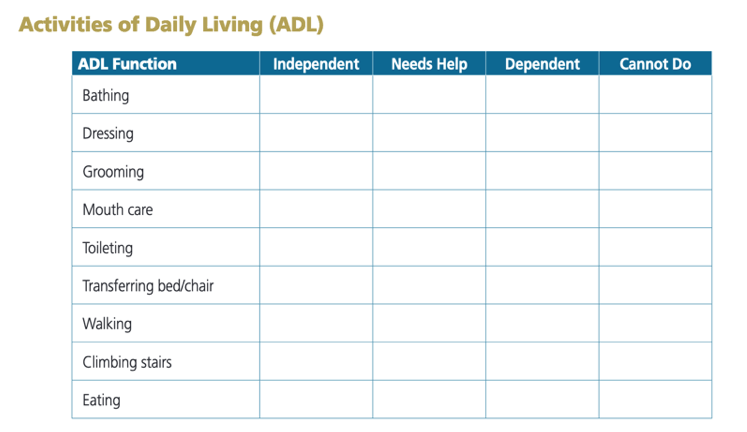| |
PLWH Had 3 X Worse Fatigue. Fatigue associated with Worse Cognition, Daily Functioning
|
| |
| |
Fatigue is associated with worse cognitive and everyday functioning in older persons with HIV - (05/23/22)
3 times more fatigue for HIV+ ( 32% vs 11%) fatigue associated with worse global cognition, worse daily functioning (IADLs), worse verbal fluency, executive function, speed of information processing, working memory. Depression WAS NOT associated with greater odds of IADL dependence. AND - however,
fatigue was not significantly associated with global cognition in persons without HIV.
"In PWH, the relationship between fatigue and global cognition became stronger after accounting for current depression, anxiety, and sleep quality
(β = -0.56, P = 0.005), and depression, anxiety, and sleep quality were not related to global cognition".
See fuller discussion below: There are a number of different biological mechanisms that have been explored in attempts to understand fatigue in PWH. Neuroanatomically, fatigue in PWH is thought to be modulated by the thalamostriatocortical circuitry involving the basal ganglia, which is particularly affected in HIV [45]. Furthermore, among PWH, fatigue has been found to associate with increased inflammation. It is well established that these brain regions and neuroinflammation are implicated in the pathogenesis of HAND [50]; therefore, fatigue and cognition may be associated with one another because of some common underlying mechanisms. Lastly, mitochondrial dysfunction in the brain is also thought to contribute to fatigue

The aim of this study was to determine whether there are relationships between fatigue, cognition, and everyday functioning in older persons with and without HIV and to examine if associations remain after accounting for depression, anxiety, and sleep quality. Sixty-nine persons with HIV (PWH) and 36 persons without HIV, aged 50-74 years, were recruited from ongoing studies at UC San Diego's HIV Neurobehavioral Research Program and from the community. Participants completed neuropsychological testing, a performance-based measure of everyday functioning, and self-report questionnaires of fatigue, depression, anxiety, sleep quality, and everyday functioning
In this cross-sectional study, PWH had significantly greater fatigue than the HIV-negative group (g = 0.83; P < 0.01).
PWH reported significantly greater fatigue than HIV-negative participants [PWH: median 32% (12.5-46.5); HIV-: median = 11.5% (0-27.25); P< 0.00
When stratifying by HIV serostatus, greater fatigue was significantly associated with worse global cognition (β = -0.56;P < 0.01) in PWH even when controlling for covariates; however, fatigue was not significantly associated with global cognition in persons without HIV.
Moreover, fatigue was also associated with greater risk of IADL dependence (instrumental activities of daily living) - normal daily functioning. The major domains of IADLs include cooking, cleaning, transportation, laundry, and managing finances. Occupational therapists commonly assess IADLs in the setting of rehab to determine the level of an individual's need for assistance and cognitive function.
Fatigue was significantly associated with worse verbal fluency (β = -0.61, P = 0.003), executive function (β = -0.55, P = 0.006), speed of information processing (β = -0.49, P = 0.016), working memory (β = -0.60, P = 0.003), and complex motor functioning (β = -0.44, P = 0.029). Fatigue was not significantly associated with learning (β = 0.02, P = 0.936) or delayed recall (β = 0.17, P = 0.384). See Table 2 and Fig. 3 for model estimates. When examining self-reported everyday functioning in PWH, those who reported dependence in IADLs had significantly greater fatigue (dependent median: 40.5 [32,51]; independent median: 19 [2,35]; P < 0.001). When accounting for psychiatric and sleep factors, greater fatigue was associated with higher odds of IADL dependence [odds ratio (OR): 1.66 for a 10-point increase in fatigue; P = 0.039] but depression, anxiety, and sleep quality were not significantly associated with greater odds of IADL dependence (Ps > 0.15).

When examining performance-based functioning in PWH, fatigue was not univariately associated with UPSA-B performance in PWH (β = 0.01, P = 0.952). Accounting for psychiatric symptoms and sleep quality did not change the results (β = 0.08, P = 0.724; see Table 2), and anxiety, depression, and sleep quality were not significantly associated with UPSA-B performance (Ps > 0.500).. The UPSA-B is a measure of functional capacity in which patients are asked to perform everyday tasks in two areas of functioning: communication and finances: The UPSA-2 includes the following 6 subscales: Financial Skills, Communication, Comprehension/Planning, Transportation, Household Management and Medication Management.
In PWH, the relationship between fatigue and global cognition became stronger after accounting for current depression, anxiety, and sleep quality (β = -0.56, P = 0.005), and depression, anxiety, and sleep quality were not related to global cognition (Ps > 0.100)
Fatigue was moderately to strongly associated with lifetime history of major depressive disorder (PWH: g = 0.81, P = 0.003; HIV-: g = 0.87, P = 0.029), depressive symptoms (PWH: p = 0.74, P < 0.001; HIV-: p = 0.57, P < 0.001), anxiety symptoms (PWH: p = 0.51, P < 0.001; HIV-: p = 0.41, P = 0.013), and sleep quality (PWH: p = 0.49, P < 0.001; HIV-: p = 0.40, P = 0.021).
More research is needed to better understand the biological underpinnings of fatigue in PWH as this may lead to better treatment or prevention of fatigue, which may in turn promote cognitive and everyday functioning in older PWH.
There are a number of different biological mechanisms that have been explored in attempts to understand fatigue in PWH. Neuroanatomically, fatigue in PWH is thought to be modulated by the thalamostriatocortical circuitry involving the basal ganglia, which is particularly affected in HIV [45], but the relationship between fatigue and these brain regions has been more extensively studied in other diseases and disorders, such as multiple sclerosis and chronic fatigue syndrome [46,47]. This hypothesis is particularly relevant for these findings given that these brain regions are associated with processing speed. The literature on brain correlates of fatigue in PWH is limited, but one study did find that there were lower levels of a cellular energy marker (i.e. creatine) in the basal ganglia in PWH with fatigue [25]. Furthermore, among PWH, fatigue has been found to associate with increased inflammation and number of polymorphisms in genes involved in inflammatory expression [48,49]. It is well established that these brain regions and neuroinflammation are implicated in the pathogenesis of HAND [50]; therefore, fatigue and cognition may be associated with one another because of some common underlying mechanisms. Lastly, mitochondrial dysfunction in the brain is also thought to contribute to fatigue. Although this relationship has not been extensively studied in PWH, mitochondrial dysfunction is observed in PWH and has been associated with HAND [51,52]. The underlying cause of fatigue in PWH is complex and likely multifactorial; a better understanding of these underlying mechanisms may lead to improved treatment or prevention of fatigue in PWH.
Fatigue is sometimes viewed as a symptom of depression, and our study demonstrates that fatigue in older PWH may relate to objective cognitive deficits, and interventions to improve fatigue may be beneficial for both cognition and daily functioning. For example, cognitive training programs focused on improving processing speed in PWH have been shown to improve lab-based IADL functioning [55,56]. However, these studies did not specifically examine fatigue; therefore, future studies should examine if cognitive training programs can improve processing speed, and by extension everyday functioning, in PWH with fatigue.
We should note that fatigue is a complex construct and has overlapping characteristics with a number of other constructs, such as 'brain fog' and chronic fatigue syndrome (CFS).
|
|
| |
| |
|
|
|